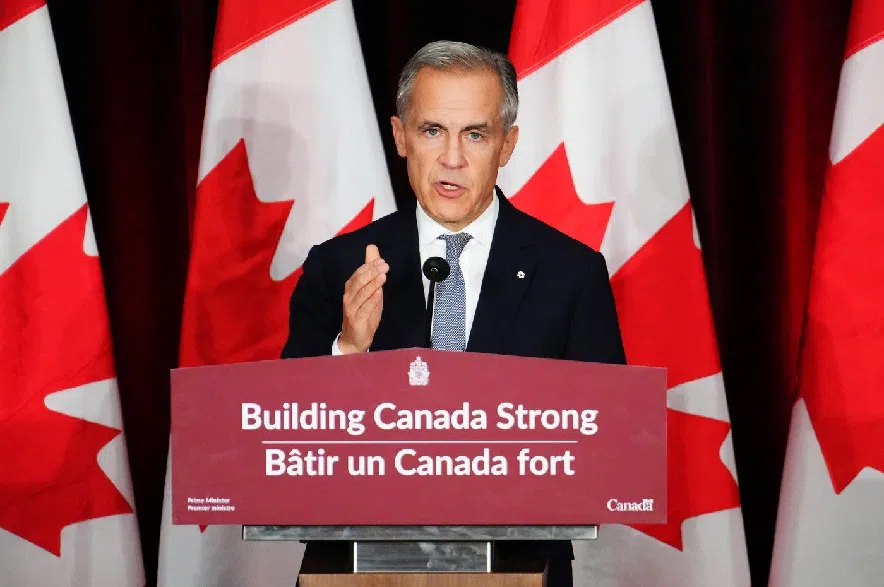Prime Minister Mark Carney promised the nation Wednesday evening the fall budget will spur unseen levels of private sector investments, but at the same time he warned that sacrifices are in store.
The prime minister said the core of his government’s fiscal strategy will be to spur “unprecedented” investments in Canada over the next five years, and asserted that Ottawa has the “fiscal capacity to act decisively.”
Read more:
- A list of promises from Saskatchewan’s speech from the throne
- Liberals expected to introduce bill with tougher bail, sentencing rules today
- Anand says Canada is in a ‘strategic partnership’ with China
“Now is not the time to be cautious because fortune favours the bold,” Carney said in a speech at the University of Ottawa Wednesday evening, designed to set the stage for his first fiscal plan that is due to be released Nov. 4.
The prime minister warned Canada can no longer be overly reliant on the U.S. as a trading partner after President Donald Trump lashed out with tariffs at levels not seen since the Great Depression. Carney warned the bilateral relationship “will never be the same as it was.”
He said he is setting an “ambitious” goal to double Canada’s non-U.S. exports in the next decade to generate $300 billion more in trade.
While Carney said the economy is holding up for the moment despite Trump’s tariff barrages, he stated that “if we don’t act now, the pressures will only grow,” and pledged his plan will contain “generational investments.”
The prime minister vowed he will “always be straight” about the “challenges” Canada is facing — and that some will be difficult.
“We won’t transform our economy easily or in a few months. It will take some sacrifices and some time,” Carney said.
Carney said he will introduce spending restraints, pledging to pare back operational expenditures by cutting waste and doing more with less. Even with those measures in place, he said the country “will have to do less of some of the things that we want to do so we can do more of what we must do.”
He said coming budget will include a climate competitiveness strategy that will prioritize results over objectives, a new immigration plan and an international talent-attraction strategy aimed at scooping up workers who otherwise would have looked to working in the U.S.
The prime minister said Canada is poised to launch into a building spree — of homes and large industrial projects — and promised it will be a “great time to be in the trades.”
But to do all these things, Carney will need to secure support in the current minority Parliament from other parties to pass the marquee spending plan.
Conservative Leader Pierre Poilievre said he told Carney earlier in the day in a private meeting that he must present an “affordable budget” that slashes taxes and caps the deficit.
“People can’t afford to pay more, that they’re tapped out; the grocery bills, the rent is too high after 10 years of excess spending,” Poilievre said.
The Conservative leader insists the overall budget deficit must not raise above $42 billion. But economists have already forecast it will be higher than that.
The minority Liberal government is three votes shy of being able to pass measures on its own and will need either the support or abstention of members of other parties to pass the budget.
A vote in the House of Commons on a budget motion is a confidence matter, meaning the Carney government could fall if it loses, potentially plunging the country into an early election after holding one just this past spring.
Government House Leader Steven MacKinnon has warned he is “starting to worry” about whether the budget will fail to pass.
“The opposition parties are, in my view, being very, very cavalier about the country’s future,” MacKinnon said Wednesday.
Bloc Québécois Leader Yves-François Blanchet, who also spoke with Carney on Wednesday, has put forward a list of conditions to be met before his party supports the Liberal budget.
Blanchet said the Bloc has made its demands clear to the Liberals for many months.
“They know our conditions, and if they wake up a little bit late, it’s once again their problem,” he said.
Carney has already met with the NDP and Green leaders.
Bea Bruske, president of the Canadian Labour Congress, meantme warned after Carney’s speech that austerity measures would be unhelpful at a time when workers are struggling, and said they “cannot be asked to pay the price through cuts to the public services and supports their families rely on.”
The prime minister is scheduled to travel later this week to economic summits in Asia that will take place in the days leading up to the budget.
The Conservatives used the prospect of an early election to solicit money from donors this week.
— With files from Catherine Morrison, Jim Bronskill, Nick Murray and Craig Lord
This report by The Canadian Press was first published Oct. 22, 2025.











